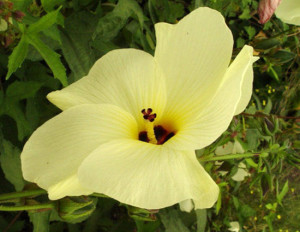Abelmoschus is a genus of about fifteen species of flowering plants in the mallow family, Malvaceae, native to tropical Africa, Asia and northern Australia. It was formerly included within Hibiscus, but is now classified as a distinct genus.
Contents
Uses
Several species are edible, with both the young seed pods and the young leaves being eaten as a vegetable. The most important commercially-grown species is okra.
Abelmoschus manihot (aibika) furnishes cordage like jute, and Abelmoschus moschatus (musk mallow) is grown for musk seeds (musk ambrette, which causes photoallergy).
Benefits
- The strong smell of the seeds makes the plant an ideal inhalant to alleviate hoarseness and a dry throat.
- The leaves and roots of the plant are helpful in treating gonorrhea and venereal diseases.
- The Ambrette Plant is used as an ingredient in cosmetics like perfumes, soaps, detergents, creams and lotions.
Cautions
-
- An allergic skin reaction (called contact dermatitis) and sensitivity to light has been reported after ambrette use.
- Ambrette may also cause increased skin coloration (called hyperpigmentation) or make individuals more sensitive to laser treatment.
- Use cautiously in patients with low blood sugar levels.
Interactions
- Interactions with Drugs
- Abelmoschus may reduce blood sugar levels. Caution is advised when using medications that may also lower blood sugar levels. Patients taking drugs for diabetes by mouth or insulin should be monitored closely by qualified healthcare professionals, including pharmacists. Medication adjustments may be necessary.
- Abelmoschus may cause increased skin coloration (called hyperpigmentation) and increase sensitivity to sun. Using ambrette with photosensitizers may increase this sensitivity.
- Although not well understood in humans, ambrette may affect the body’s opioid system.
Other names
Malvaceae, Hibiscus abelmoschus Linn, Ambrette Plant, Musk Mallow
References
Source: Wikipedia, https://en.wikipedia.org/wiki/Abelmoschus
Himalayawelness, http://www.himalayawellness.com/herbfinder/abelmoschus-moschatus.htm
LivingNaturally, http://www.livingnaturally.com/ns/DisplayMonograph.asp?StoreID=3D9D155236034A5897378F7C5A033221&DocID=bottomline-ambrette

